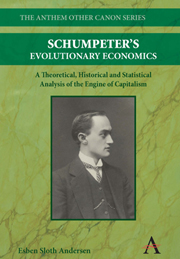 Schumpeter's Evolutionary Economics
Schumpeter's Evolutionary Economics Book contents
- Frontmatter
- Contents
- List of Figures
- List of Tables
- Preface
- Acknowledgements
- Abbreviations
- 1 Introduction
- I Equilibrium Economics and Evolutionary Economics
- II The Evolutionary Trilogy
- III Works in Progress
- 10 Schumpeter and the Years of High Theory
- 11 Evolutionary Analysis and the History of Economics
- 12 Beyond Schumpeter's Evolutionary Economics
- Appendices
- Schumpeter's Works
- Other References
- Index of Schumpeter's Works
- Index of Persons
12 - Beyond Schumpeter's Evolutionary Economics
from III - Works in Progress
Published online by Cambridge University Press: 05 March 2012
- Frontmatter
- Contents
- List of Figures
- List of Tables
- Preface
- Acknowledgements
- Abbreviations
- 1 Introduction
- I Equilibrium Economics and Evolutionary Economics
- II The Evolutionary Trilogy
- III Works in Progress
- 10 Schumpeter and the Years of High Theory
- 11 Evolutionary Analysis and the History of Economics
- 12 Beyond Schumpeter's Evolutionary Economics
- Appendices
- Schumpeter's Works
- Other References
- Index of Schumpeter's Works
- Index of Persons
Summary
In the beginning of the present book, Paul Samuelson (1981a, 1) was quoted suggesting that Schumpeter at the end of his life “would have traded his Popeship for a Keynesian revolution.” The preceding chapters have reconstructed the type of scientific revolution Schumpeter tried to promote. His main ambition was to complement the reformed branch of equilibrium economics with a new evolutionary branch of the science of economics. Since Schumpeter's evolutionary economics was largely a personal affair, he only became the “Pope” of the reformation of equilibrium economics. He became a ‘heterodox Pope’, however, since his dual research programme not only led to praise of Samuelson's (1947) Foundations of Economic Analysis, but also to the recognition of its inadequacy with respect to his wished-for establishment of evolutionary economics as a viable branch of the science of economics. Actually, Schumpeter's ambition seems to have been to write a book that could have had the title ‘Foundations of Evolutionary Economic Analysis’. Such a book would probably have emphasised not only evolutionary economic theory, but also the related statistics and history. As a co-founder of the Econometric Society, he seems to have hoped that the econometric alliance between theoretical and statistical studies would help to develop evolutionary economics. The underdevelopment of his evolutionary analysis, however, served to drive ambitious theoreticians and econometricians away from him. The major thing he could do was to point out that they thereby ignored crucial facts about capitalist economic evolution.
- Type
- Chapter
- Information
- Schumpeter's Evolutionary EconomicsA Theoretical, Historical and Statistical Analysis of the Engine of Capitalism, pp. 369 - 410Publisher: Anthem PressPrint publication year: 2009


